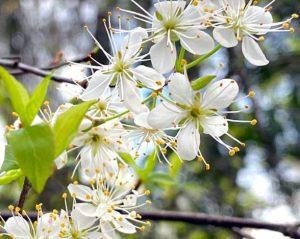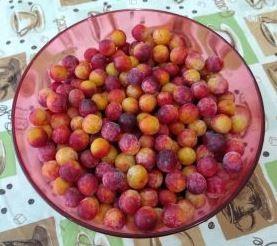Flatwoods Plum
Prunus umbellata
Unknown to most local residents, the Flatwoods Plum is a nice option for a small tree and is covered in white blooms each year in late February or early spring.
Size
- Its mature size is about 15 to 20 feet tall by 15 to 20 feet wide.
- Since most housing lots here are not large, planting one of these would make more sense than using a live oak or other full size tree in this setting.
- It is suitable for use as a specimen or lawn tree.
- Roots are not a problem.
Leaves
This tree is deciduous, and leaves are simple and 1 to 2 inches long.
Flowers
Flowers are white and have attractive yellow anthers.
But what conditions are necessary to grow a Flatwoods Plum?
- This tree likes moist but well drained soil and is not too particular about the ph.
- Full sun or part sun will work, though some afternoon shade is best.
- It will need some irrigation in dry weather.
- Zones 8a to 10a are OK.
In Florida, the Flatwoods Plum is naturally found as an understory tree in deciduous forests of the northern half of the state. While wild specimens have not been found in Osceola County, they are documented in nearby Orange, Polk, and Brevard Counties.
An interesting asset of this tree is its ability to produce fruit. The plums are one half to 1 inch in size, and begin with a yellow color, which changes to reddish, and then purple or even black when ripe. Fruit is edible, though often tart, and is best used in jams or jellies. Just be sure to remove all seeds before use, since traces of toxic compounds may be found in them. Wildlife, such as deer, bears, squirrels, foxes, raccoons, and birds love the fruit. Butterflies, bees, and other pollinators are attracted to the blooms. Birds help to disperse the seeds. Historically, the tree was often called a Hog Plum, since its fruit was often used to feed livestock.
What else is necessary in order to take care of a Flatwoods plum?
Some pruning may be necessary if you want it to be a small tree with one trunk, and lower branches may need to be removed if you don’t want to use it as part of a shrub border. Later, little pruning is necessary Propagation is by stratified seed. While the tree may be susceptible to verticillium wilt, generally pests and diseases are not a problem. Lifespan is thought to be 30 to 40 years. Most likely, this tree will be found at native plant nurseries.

Flatwoods Plum (Prunus umbellata)

Flatwoods Plum blooms

Hog Plums
Need more information:
For more information about Florida Friendly Plants and Wildlife you can email me at epabon5@ufl.edu or like us to learn about new classes or events at Gardening in Central Florida
By: Sandy Switek since 2005 and Eva Maria Pabon Residential Horticulture Agent
Do you want to read more about gardening? Follow our blog Eva Pabon, Author at UF/IFAS Extension Osceola County (ufl.edu)
Source: UF/IFAS Pest Alert
Note: All images and contents are the property of UF/IFAS.



